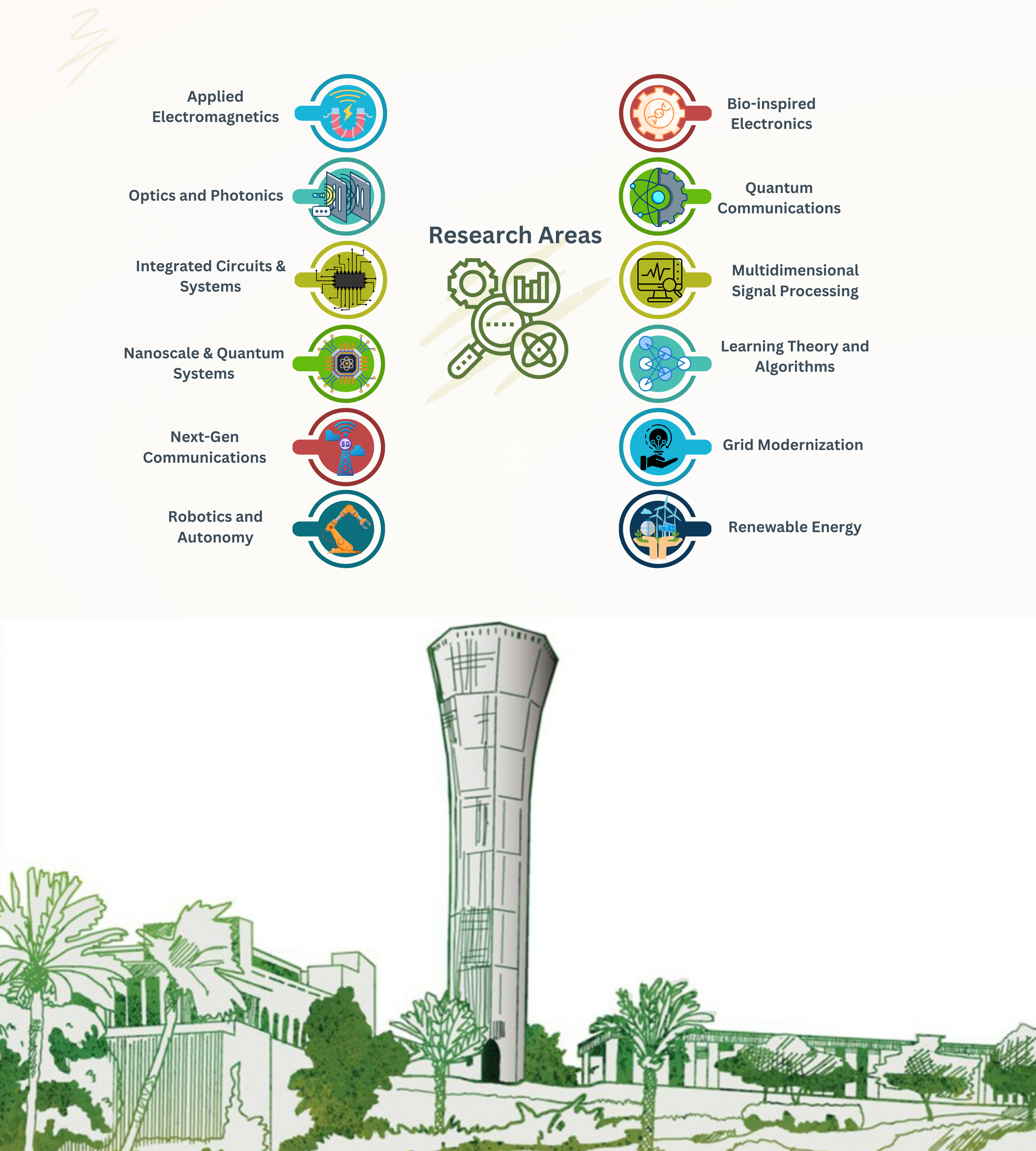
Applied Electromagnetics
Coordinator: Dr. Ali Al-Reshaid
The group is experienced in computational electromagnetics includes but not limited to the finite-difference time-domain (FDTD) and applications of machine-learning (ML) and artificial intelligence (AI) is solving electromagnetic problems. In addition to the theoretical and computational aspects, the group research interests cover applications of electromagnetics in biomedicine, radar, backscatter communications, and remote sensing.
Affiliates:
- Dr. Sharif Sheikh
- Dr. Hussein Attia
- Dr. Ahmed Omar
- Dr. Abdullah Algarni
- Dr. Mohammad Alhassoun
- Dr. Abdurahman AlQadami
- Dr. Umar Johar
- Dr. Yazan Al-Alem
- Dr. Ali Alreshaid
Optics and Photonics
Coordinator: Dr. Khurram Qureshi
This research field spans a vast range of topics, from fundamental studies of light to the development of sophisticated devices and technologies with applications in medicine, telecommunications, astronomy, environmental monitoring, and beyond. Researchers in this field continue to push the boundaries of knowledge, leading to groundbreaking innovations that shape our modern world.
Affiliates:
- Dr. Fahhad Alharbi
Integrated Circuits & Systems
Coordinator: Dr. Zainulabideen Khalifa
The research interests encompass a wide array of areas, including analog, mixed-signal, and RF CMOS ICs, DC-DC converters, voltage-mode, current-mode, and time-mode circuits, RF-DC converters, as well as low-voltage and power-efficient circuits specifically designed for biomedical applications. Complementing their pioneering research, ICSG academic members are dedicated educators, offering a range of undergraduate and graduate courses that cover diverse aspects of circuit and system design.
Affiliates:
- Dr. Muneer Al-Absi
- Dr. Hussein Al-Zaher
- Dr. Saad Al-Shahrani
- Dr. Alaa Hussein
- Dr. Mohammad Al-Gahtani
- Dr. Abdulaziz Tabbakh
Nanoscale & Quantum Systems
Coordinator: Dr. Jhonathan Rojas
This area of research explores the fundamental properties of matter and energy at the smallest scales. It seeks to understand and harness the unique properties of nanomaterials and quantum mechanics to develop new technologies and materials for a wide range of applications, including energy harvesting devices, 2D-materials based electronics, flexible electronics, spintronics, neuromorphic computing, and numerous others.
Affiliates:
- Dr. Hussain Alsalman
- Dr. Abdulaziz Almutairi
Next-Gen Communications
Coordinator: Dr. Daniel Da Costa
The design, optimization and physical layer security of emerging technologies leading to the next generation wireless communications and sensing, including internet of things (IoT), mm-Wave communications, visible light communication (VLC), reflecting intelligent surfaces (RIS), symbiotic radio, satellite-UAV-ground networks among others.
Affiliates:
- Dr. Salam Zummo
- Dr. Ali Muqaibel
- Dr. Ali Arshad Nasir
- Dr. Saad Al-Ahmadi
- Dr. Abdallah Al-Ahmari
- Dr. Wajih Abdulelah Abu-Al-Saud
- Dr. Suhail Al-Dharrab
- Dr. Samir Alghadhban
Robotics and Autonomy
Coordinator: Dr. Ali AlBeladi
Robotic and Autonomous systems are interdisciplinary technologies poised to see increased importance in manufacturing, transportation, aerospace, defense, health care, and many other critical fields of application. They are expected to perform tasks in highly dynamic and complex environments. This capability is achieved by developing algorithms that allow the system to learn, adapt, predict, and reason continually.
Affiliates:
- Dr. Muhammad Rehan
- Dr. Brahim Brahmi
Renewable Energy
Coordinator: Dr. Muhammad Khalid
We concentrate on diverse domains such as advanced energy storage technologies, hydrogen systems, enhancing power quality, seamless integration of renewable energy into the grids, designing efficient power converters, developing net-zero building solutions, creating electric vehicle charging infrastructure, promoting e-mobility, and smart grids. These efforts, combined with AI-driven modern approaches, cutting-edge technologies, state-of-the-art facilities, and expert professionals, drive our collective journey towards a more eco-friendly and sustainable future.
Affiliates:
- Dr. Mohamed Abido
- Dr. Mahmoud Kassas
- Dr. Ali Al-Awami
- Dr. Abdulaziz Mohammed Qwbaiban
Grid Modernization
Coordinator: Dr. Fahad Al-Ismail
In the Grid Modernization Research Area, innovative approaches are being pioneered to advance the integration of sustainable energy resources into the power grid. Digitalization and IoT technologies are critical key enablers, facilitating the deployment of advanced cybersecurity systems and leveraging data analytics for optimized grid planning, operation, and control. This effort sets new benchmarks for creating a resilient, reliable, intelligent, and secure cyber-physical power grid.
Affiliates:
- Dr. Mohammad Al-Muhaini
- Dr. Suhail Shaikh
- Dr. Umer Amir
- Dr. Maad Al-Owaifeer
- Dr. Ahmed S. Alahmed
Learning Theory and Algorithms
Coordinator: Dr. Azzedine Zerguine
The research area focuses on developing foundational learning theories and advanced algorithms to enhance machine learning efficiency, generalization, and robustness. It explores optimization techniques, statistical learning, and theoretical guarantees for AI models, addressing challenges like scalability, uncertainty, and bias. The goal is to design intelligent systems with improved adaptability, interpretability, and performance across diverse applications, from autonomous systems to data-driven decision-making.
Affiliates:
- Dr. Wail Mousa
- Dr. Mohamed Mohandes
- Dr. Naveed Iqbal
- Dr. Abdullah Al-Battal
Multidimensional Signal Processing
Coordinator: Dr. Mudassir Masood
The work spans seismic signal processing in which seismic profiling is conducted in geophysical exploration. 2-D Discrete Fourier Transform and Wavelet Transform are used. 2-D Filtering for images, radar and other applications are performed.
Affiliates:
- Dr. Ali Alshaikhi
- Dr. Motaz Alfarraj
Quantum Communications
Coordinator: Dr. Wessam Mesbah
The concept of Quantum communication networks (QCNs) is a promising new technology that uses the power of quantum mechanics to achieve unprecedented levels of security, sensing, and computing. One of the key features of QCNs is the ability to create and distribute entangled quantum states between distant nodes. In addition to security, QCNs also have the potential to enable new types of sensing and computing applications.
Affiliates:
- Dr. Junaid ur Rehman
Bio-inspired Electronics
Coordinator: Dr. Hussam Alshammari
The research area explores bio-inspired electronics, drawing inspiration from biological systems to develop efficient, adaptive, and resilient electronic circuits and devices. It focuses on neuromorphic computing, bio-sensors, and low-power electronics, aiming to enhance performance, energy efficiency, and real-time processing. Applications range from artificial intelligence hardware to biomedical devices, enabling smarter and more sustainable electronic systems.
Affiliates:
- Dr. Yaqub Mahnashi
- Dr. Abdullah Al-Othman